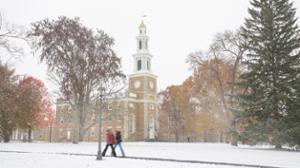
“Funding for such efforts, which has never been adequate, has declined precipitously in recent years, putting the country’s national security and economic competitiveness at risk,” the authors wrote. “Just 20 percent of American K-12 students study a foreign language. Only about 7 percent study foreign languages in college and the number who do is declining.”
The authors pointed to issues arising from Russia’s invasion of Ukraine, heightened economic and military competition with China, nuclear brinksmanship by North Korea, and the continued threat of international terrorism, as evidence now that increased government support for the study of foreign languages, history, politics, and culture is essential.
The two authors also expressed their opinion in reaction to an essay titled “When colleges take political positions, they show who isn’t wanted” in The Washington Post by columnist George Will. Published on Jan. 27 under the title “What belongs in marketplaces of ideas?,” they responded, “George F. Will is half right: Colleges and universities that take institutional positions on public controversies do risk inhibiting the unfettered inquiry and debate that should be central to campus life.
“But we believe leaders in higher education should weigh in on campus free speech, affirmative action, visa and immigration policies affecting students, faculty or staff, and other issues that have a direct and significant impact on their operations or higher education” they wrote.
The authors contend “…It is therefore entirely appropriate, and indeed incumbent, on colleges and universities to address the impact of the Supreme Court’s Dobbs decision on the reproductive health services they provide or, for institutions with medical schools, on the training they offer.”
Posted February 3, 2023


